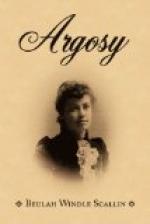In a trice Mr. Hamlyn was off his own steed and raising her. She was not hurt, she said, when she could speak; a little shaken, a little giddy—and she leaned against the fence. The refractory horse, unnoticed for the moment, got upon his legs, took the fence of his own accord and tore away after the field. Young Mr. Threpp, who had been in some difficulty with his own steed, rode up now.
“Shall I ride back to the Hall and get the pony-carriage for you, Miss Eliza?” asked the young man.
“Oh, dear, no,” she replied, “thank you all the same. I would prefer to walk home.”
“Are you equal to the walk?” interposed the stranger.
“Quite. The walk will do away with this faintness. It is not the first fall I have had.”
The stranger whispered to young Mr. Threpp—who was as good-natured a young fellow as ever lived. Would he consent to forego the sport that day and lead his horse to Mr. Peveril’s? If so, he would accompany the young lady and give her the support of his arm.
So William Threpp rode off, leading Mr. Hamlyn’s horse, and Miss Monk accepted the stranger’s arm. He told her a little about himself as they walked along. It might not have been an ominous commencement, but intimacies have grown sometimes out of a slighter introduction. Their nearest way led past the Vicarage. Mr. Grame saw them from its windows and came running out.
“Has any accident taken place?” he asked hurriedly. “I hope not.”
Eliza Monk’s face flushed. He had been Lucy’s husband several months now, but she could not yet suddenly meet him without a thrill of emotion. Lucy ran out next; the pretty young wife for whom she had been despised. Eliza answered Mr. Grame curtly, nodded to Lucy, and passed on.
“And, as I was telling you,” continued Mr. Hamlyn, “when this property was left to me in England, I made it a plea for throwing up my post in India, and came home. I landed about six weeks ago, and have been since busy in London with lawyers. Peveril, whom I knew in the days gone by, wrote to invite me to come to him here on a week’s visit, before he and his wife leave for the South of France.”
“They are going to winter there for Mrs. Peveril’s health,” observed Eliza. “Peacock’s Range, the place they live at, belongs to my cousin, Harry Carradyne. Did I understand you to say that you were not an Englishman?”
“I was born in the West Indies. My family were English and had settled there.”
“What a coincidence!” exclaimed Eliza Monk with a smile. “My mother was a West Indian, and I was born there.—There’s my home, Leet Hall!”
“A fine old place,” cried Mr. Hamlyn, regarding the mansion before him.
“You may well say ‘old,’” remarked the young lady. “It has been the abode of the Monk family from generation to generation. For my part, I sometimes half wish it would fall down that we might get away to a more lively locality. Church Leet is a dead-alive place at best.”




